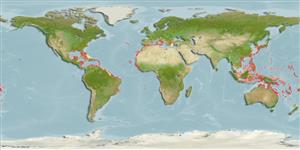Common names from other countries
Environment: milieu / climate zone / depth range / distribution range
Ecologia
marinhas associadas(os) a recifes; intervalo de profundidade 0 - 10 m (Ref. 9710). Tropical
Western Atlantic: Bermuda, Florida (USA), and northern Gulf of Mexico to Brazil. Eastern Atlantic: Mauritania and the Canary Islands to about South Africa. Also known in the southern parts of Mediterranean, including the following most southern localities of the northern coast: Torremolinos and Taramay near Motril (Spain), Sicily, Kyra Island (Gulf of Aigina) and near Palaea Epidavros, Peloponnes (Greece) (Ref. 5298). Northwest Pacific: Japan (Ref. 559, 9137, 35771) and Taiwan.
Tamanho / Peso / Idade
Maturity: Lm ? range ? - ? cm
Max length : 12.0 cm TL macho/indeterminado; (Ref. 13628)
Espinhos dorsais (total): 12; Raios dorsais moles (total): 14-15; Espinhos anais 2; Raios anais moles: 14 - 17. Resembles P. yatabei but easily distinguished by a median series of cirri on nape. A short supraorbital cirrus present (Ref. 559). Dull green or olive with dark bars on body which extend into lower part of dorsal fin (Ref. 13442).
Adults inhabit shallow rocky areas and tide pools. They hide in empty Strombus gigas shells (Ref. 13628), holes or troughs of rocks, or between algae (Ref. 5981). Herbivorous (Ref. 13442). Feed on invertebrates as juveniles and shift to diet of algae as adults (Ref. 94105). Unusual erectile nuchal crest (Ref. 41019). Oviparous. Eggs are demersal and adhesive (Ref. 205), and are attached to the substrate via a filamentous, adhesive pad or pedestal (Ref. 94114). Larvae are planktonic, often found in shallow, coastal waters (Ref. 94114).
Life cycle and mating behavior
Maturidade | Reprodução | Desova | Ovos | Fecundidade | Larvas
Oviparous, distinct pairing (Ref. 205).
Robins, C.R. and G.C. Ray, 1986. A field guide to Atlantic coast fishes of North America. Houghton Mifflin Company, Boston, U.S.A. 354 p. (Ref. 7251)
Categoria na Lista Vermelha da IUCN (Ref. 130435)
CITES (Ref. 128078)
Not Evaluated
Ameaça para o homem
Harmless
Utilização humana
Pescarias: sem interesse; Aquário: Espécies comerciais
Mais informação
ReferênciasAquaculturaPerfil para aquaculturaEstirpesGenéticaElectrophoresesHereditariedadeDoençasProcessamentoMass conversion
ColaboradoresFotografiasStamps, Coins Misc.SonsCiguateraVelocidadeTipo de nataçãoÁrea branquialOutras referênciasCérebrosVisão
Ferramentas
Relatórios especiais
Descarregue XML
Fontes da internet
Estimates based on models
Preferred temperature (Ref.
115969): 19.3 - 29.1, mean 27.4 (based on 3129 cells).
Phylogenetic diversity index (Ref.
82804): PD
50 = 0.5078 [Uniqueness, from 0.5 = low to 2.0 = high].
Bayesian length-weight: a=0.01023 (0.00595 - 0.01759), b=2.97 (2.82 - 3.12), in cm Total Length, based on LWR estimates for this species & (Sub)family-body (Ref.
93245).
Nível Trófico (Ref.
69278): 2.5 ±0.1 se; based on diet studies.
Resiliência (Ref.
120179): Elevada, tempo mínimo de duplicação da população menor que 15 meses (Preliminary K or Fecundity.).
Fishing Vulnerability (Ref.
59153): Low vulnerability (10 of 100).
